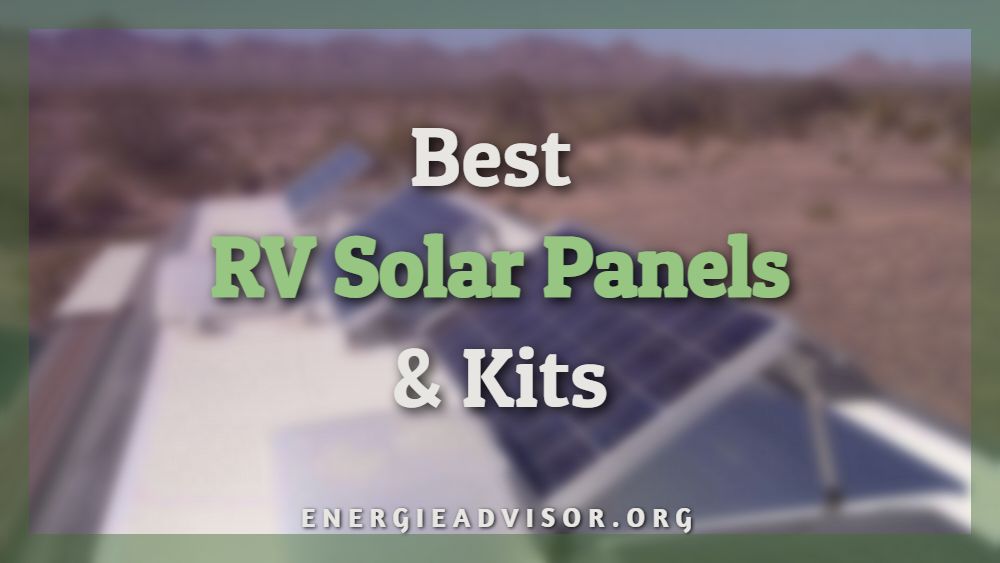A recreational vehicle is an example of the perfect application of solar power. This is why it is a great idea to think about investing in a solar panel in case you own an RV.
Even though solar energy isn’t always the most potent source of electricity, it delivers a variety of benefits to RV owners. Those benefits include easy access to components and ease of set-up, which will allow you to get a clean, green, and quiet supply of power consistently and reliably, so your batteries can be topped-off without the need to cause noise, pollution, and odor.
Comparison Table:
If you’re looking to extend your trips, RV solar panels can serve as portable chargers, allowing you to supply your onboard appliances and facilities with power by fitting the panels on the roof of your vehicle. This will put your mind at ease, knowing that some backup power is continuously being generated as long as the sun is shining.
Top Picks RV Solar Panels
1. Renogy 100 Watts 12 Volts Monocrystalline – Editor’s Pick
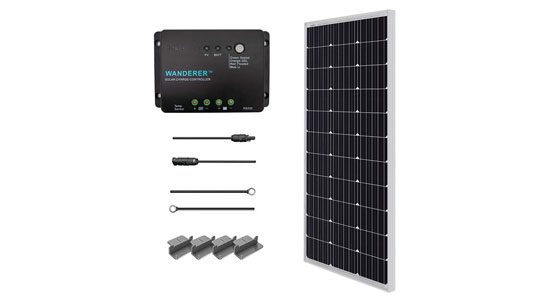
Highlights:
- Intuitive design
- Easy install
- Lightweight
- Quiet
- 4-stage charging
Our Editor’s Pick for this list goes into the hands of Renogy, one of the best companies in the business of solar panels overall, for their 100-watt 12-volt Monocrystalline Kit, which is an excellent product.
This kit provides equally impressive results when used on RVs and boats, as well as other off-grid applications like sheds, cabins, and trailers. It’s quiet power-production, and guaranteed grid independence is only a couple of the many benefits this amazing panel provides.
You can easily connect the charge controller and battery using the 8-feet, 10AWG tray cable, included in the kit. The panel has an intuitive design, featuring a flooded and sealed, fully prepared gel charging algorithm. We especially liked the fact that the battery has a four-stage charging process, because it promotes faster and more efficient charging, as well as keeping the whole process safer.
The Renogy Wanderer charge controller offers a few electronic safety features as well, namely protection from overload, reversed polarity, short circuit and overcharging, to keep your mind at ease while using the kit. The system can also be easily expanded to 400 watts. The pre-drilled holes at the back assure safe and quick mounting.
Overall, this is an excellent solar panel, which will surely last you a long time if you take care of it. It is easy to install, lightweight, and reliable, so it’s easy to see why it got our Editor’s Pick this time.
2. Acopower 500 Watts
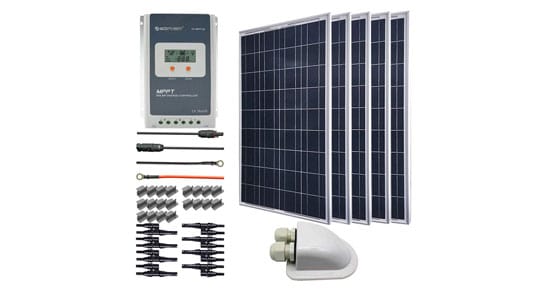
Highlights:
- Five sizes available
- Adjustable settings
- An LCD screen displays stats
- Different types of battery compatible
- One-year warranty
The ACOPOWER solar kit is available in a total of five sizes – 100W, 200W, 300W, 400W, and 500W. The largest one makes it onto our list today, because of the sheer amount of power it is capable of producing, but other than that, anything we say in this review applies for the other four sizes as well. Branch connectors can be used to create a parallel connection for the charge controller, or you can connect it in series without the use of any connectors.
The kit has a range of adjustable settings available, and those can be adjusted on the LCD screen, which comes included in the pack, and shows load draw of DC, solar panel status, battery charging, voltage, and other statistics.
A wide variety of batteries are compatible with these solar panels, including lithium, AGM, gel, and lead-acid. Mostly designed for RVs, this kit works well with boats, cabins, and homes, and can be used for backup and remote power use as well. For 24V charging in series, wire the controller with two solar panels in series, or go parallel for 12V battery charging.
Contact the manufacturer before making the order in case you have common negative grounding since the controller in this kit is adjusted for common positive grounding. All of the components in the kit come with a one-year warranty as well.
3. Windynation 100W
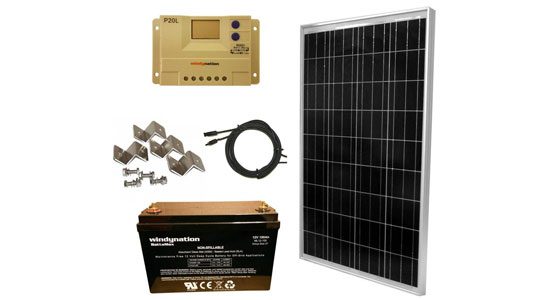
Highlights:
- Great value
- Built-in charge controller
- External temperature sensor
- Clean, renewable power
- Works well on boats, homes, and cabins too
One of the best things about the 100W Solar Panel from WindyNation is that most of the components you need to get it up and running are already included in the kit. Because of that, this product offers one of the best value-for-money propositions on the market today in terms of RV solar panels.
A P30L, 30-amp charge controller with an LCD is also included allowing the user to adjust many settings. Other components are there, too, such as the 12 AWG 40-feet solar cable, mounting hardware, MC4 connectors, and the battery temperature sensor. For users’ convenience, the manufacturer included an installation manual, as well.
This solar kit has an excellent track record, proving to be working correctly on homes, boats, and cabins, as well as recreational vehicles. It can also be used for backup and remote power with great success, providing renewable, clean, and perhaps most importantly, free electricity up to 100W.
The PWM solar charge controller is one of our favorite ones on the market, because of the simplicity of its design, allowing the user to adjust settings quickly and conveniently.
The controller can handle a maximum of four 100W panels, running on a 12-volt parallel system, or up to eight panels on a 24-volt series-wired system. Depending on the availability of the sun, the system can provide up to 350 watt-hours of charge daily. The LCD screen displays the amp-hours, as well as DC load draw, temperature, voltage, and other stats.
4. Renogy 400W Monocrystalline Solar RV
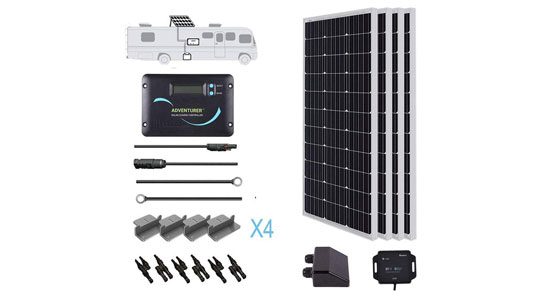
Highlights:
- Quietly recharges batteries
- Excellent for off-grid applications
- LED indicators included
- 1.5 hours for a full charge
- High-efficiency monocrystalline cells
Renogy continues to impress as one of the best solar energy manufacturers out there today. They have gotten us used to their offer of superior equipment without breaking the bank. They continue this trend with their 400W Solar RV kit, which includes everything you need to power up your RV.
And because the MPPT charge controller can handle a maximum of 800W of power on a 24V system, you can quickly expand the energy potential of this kit by simply purchasing additional Renogy panels and wiring them to the system.
It is important to note, however, that this kit doesn’t include any installation instructions, even though most previous customers say that it is an easy system to install. If you don’t have much experience with this type of work, do your research beforehand or ask the help of someone who knows what they are doing. Also, Renogy’s customer support team is there to provide advice and help with any questions you might have.
The 400W rating makes this kit ideal for location independence with small consumption, making it perfect for powering recreational vehicles and trailers, which is its intended purpose. Easy installation and lightweight design are also always necessary for travelers and people constantly on the move looking the keep their rigs powered.
Keep in mind that there have been cases of the kit arriving without the MPPT charge controller, but the issue is usually resolved quickly after sending a support ticket.
5. HQST 100 Watts 12 Volts Polycrystalline
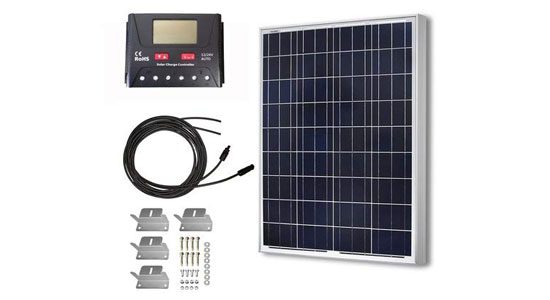
Highlights:
- Highly efficient and durable
- Easy to install
- Tempered glass and aluminum frame
- Pre-drilled holes
- Lightweight
This lightweight panel is comprised of thin plastic sheets laminated with highly advanced monocrystalline power cells. This results in a more durable and more efficient solar panel compared to regular glass and aluminum models, with a maximum system voltage of 600V of direct current, and the optimum operating voltage of 17.7 volts.
One of the most obvious ways in which this panel separates itself from the rest is its incredible physical flexibility, which makes it fast and easy to mount to almost any surface, although you shouldn’t bend it unless absolutely necessary.
Keep in mind that the frame of the panel is still made of tempered glass and corrosion-resistant aluminum, so it is still durable and able to handle high wind and snow loads, so there’s no need to worry about whether the panel is sturdy enough for your needs.
The excellent efficiency and high-module conversion impressed us the most, making this one of the best-value panels on the market today. Impressive performance is guaranteed by bypass diodes, especially when used in low-light environments. The pre-drilled holes at the back of the board ensure comfortable and secure mounting, making the process simpler and more convenient.
We expect this panel to have a long service life and excellent performance, due to multi-layered sheet lamination and advanced encapsulation materials.
6. Eco-Worthy 195W 12V Solar Panel
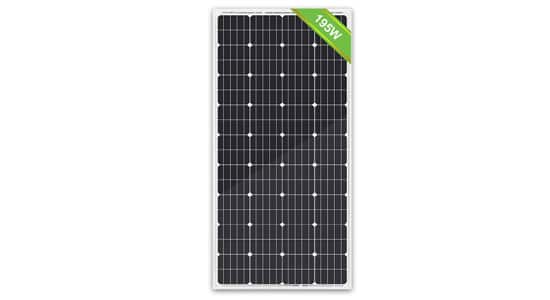
Highlights:
- 1000Wh per day output
- Corrosion-resistant frame
- Anti-reflective glass
- IP67 rated junction box
- Pre-drilled mounting and grounding holes
A perfect solar panel for off-grid applications comes from ECO-WORTHY in the form of their 12V Monocrystalline Solar Panel. This product can be used for all sorts of purposes like powering a golf cart, trailer, tent, camper, cabin, truck, yacht, sailboat, RV, and more. It has the capability of powering a 50Ah battery from 50% in about an hour and thirty minutes in ideal sunlight conditions, and its output is up to 1000Wh per day.
The panels have an impressive amount of durability, and will likely last for decades thanks to the stainless aluminum frame designed for extended use outdoors. Aside from the high-fidelity aluminum frame, other materials used in the making of this panel are low iron-tempered glass with high transparency and anti-reflection capabilities, featuring impact resistance and enhanced stiffness.
Total protection from low-pressure water jets and environmental particles are provided by the IP67 rated junction box. The back of the panel features pre-drilled holes for quick and easy mounting and extra security, as well as pre-drilled grounding holes, which make this panel perfect for large rail mounts providing additional safety and support.
This panel will easily keep your lights on, let you run your power tools and AC, as well as your DVD player and TV while allowing you to charge your phone and tablet for a three-day weekend without any issues.
7. Allpowers Sunpower 100W RV Solar Panel
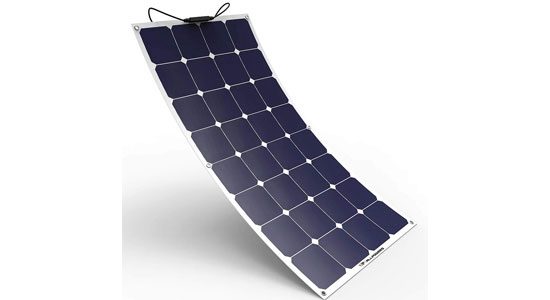
Highlights:
- Flexible
- Internal blocking diode built-in
- Compact and light
- Simple installation process
- Highly efficient
One of the things that we liked the most about this bendable solar panel from Allpowers is that it has an excellent energy-efficiency rating of 23 – 25% thanks to its utilization of the SunPower Solar Cell. That means this flexible panel is more efficient than most products of this type on the market.
The internal blocking diode built into the panel prevents reverse current drain – a problem that usually occurs at night when the sun is on the other side of the planet and can’t help produce current in our panel.
The main advantage of a flexible board is that it can be used in tight spaces and on curved surfaces such as those you might find on boats and RVs, which are usually off-limits to the stiffer, more traditional glass and aluminum models.
The fact that the panel can be curved and bent up to a thirty-degree angle is more than impressive, and it provides a smooth mounting experience you will need if you want to make the most of your day in whatever area you’ve reached with your RV.
The panel is also quite compact in terms of size and lightweight, but despite being convenient to set up, remove and transport, the product feels robust, and the power it provides speaks for itself. This model can service both 12V and 18V batteries, and its unique frameless design makes it extra easy to use.
Finding the Best Solar Panels for RV- Buying Guide
Now that you’ve seen our list of the best RV solar panels out there, it’s time to learn how to decide which one is perfect for you. Just like with any product, you need to keep a few things in mind, and in the next few paragraphs, we will explain what those things are, and give you an excellent starting point for your search.
Things to Consider When Choosing the Best Product
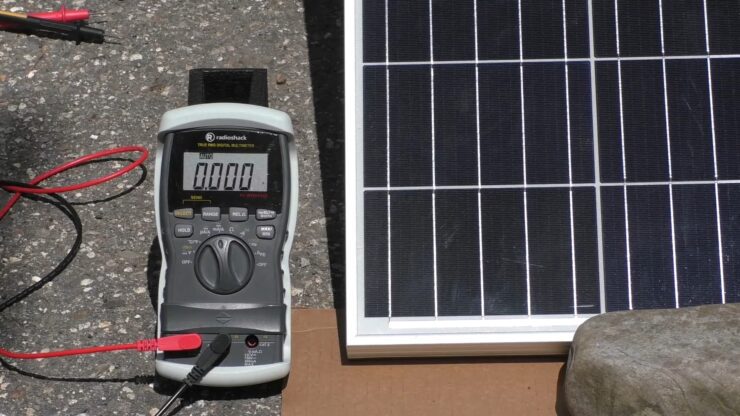
1. Usage
Before you go out and buy a solar panel for your RV, you should ask yourself what exactly you will be using it for and what your power requirements are.
If all you need is RV battery charging, and you’re looking for a solar panel to provide enough power for that, and only that, you don’t need an industrial-grade huge solar kit. An entry-level, low-price solar package would be more than enough for those purposes.
If you want, however, to use the solar panel(s) for powering other electrical equipment like power tools, TV, and other onboard facilities, it’s a good idea to go for a more powerful and robust solar panel system.
If you’re not sure what you’re going to be using the solar panels just yet, and would perhaps like to have a bit of flexibility, our advice is to start small, with a set of two panels. This will allow you to add more panels over time if you should choose to do so.
2. Versatility
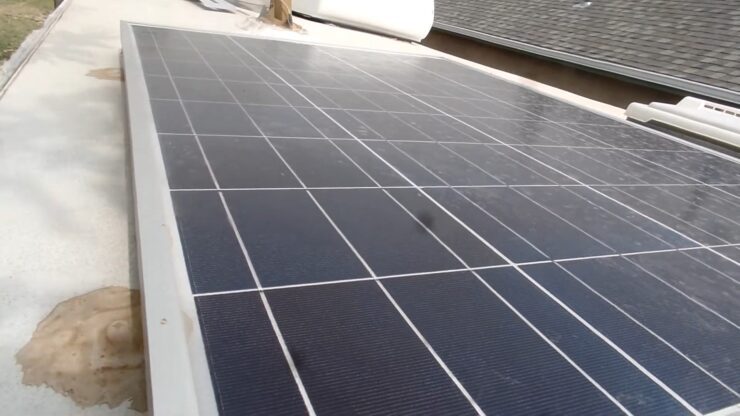
The expandability mentioned in the previous paragraph leads us to our next important factor – versatility. You should know how versatile the solar panel is that you are planning to buy. Expandability is one of the features that make for a versatile board, and it is undoubtedly vital.
Many people start small with just a panel or two, but as they start realizing how great solar power is, they get ‘hooked’ and start expanding their power-generating equipment. It’s good to have that option, and if you think you could be one of these people, look for a solar panel kit that will let you expand to at least 400W in the future.
Another mark of versatility in an RV solar panel is physical flexibility. If your panels are bendable, they can allow you to use them in many situations, and mount them on surfaces that are less reachable and slightly curved. For real adventurers, this will be a huge plus.
3. Technology
If you’re on the lookout for a solar panel of any kind, it’s a good idea to know a little about the different types that exist and the different technologies they utilize. That way, you can have a clearer idea of what you’re buying and how a specific model can fit your particular needs.
Monocrystalline solar panels are made of one large silicon crystal. This is considered the most efficient solar panel type because it provides high output. Another strength of this type is that it can produce higher amounts of power in low light conditions compared to other panel types.
Made of a few smaller crystals, polycrystalline panels are a popular choice among RV users, because of their flexibility, even though their output is not as high.
Finally, amorphous, or thin-film panels, are created from a thin layer of silicon spread on a large surface. These panels are usually cheaper, as they are not as expensive to make, but they produce the lowest amount of power.
4. Efficiency
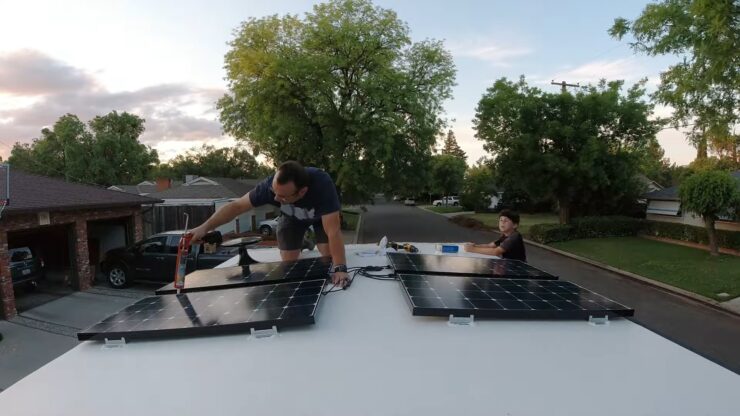
Although you could go out and buy the biggest RV solar panels out there, that’s not always the best idea, because they are going to take a lot of space and might be unnecessarily pricy and difficult to mount. What you need is a mix between affordability, versatility, and efficiency, so take a good look at the output each panel produces compared to its price, size, and weight before making your purchase.
A solar power system is not a cheap investment, so try to pick a kit that will provide you with the amount of power you need for the most reasonable amount of money. In terms of space, you’ll have to decide whether you’d like to sacrifice lots of it for added power output and flexibility of the panel.
Important Features to Look for
1. Charge Controller
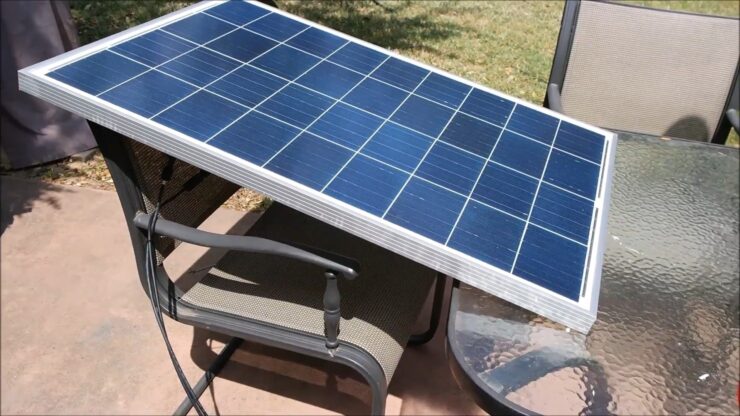
As its name clearly states, this component of a solar panel kit exists to control the charge of the solar panels since the rate at which they produce energy is not the same throughout the day due to the variability of their exposure to the sun.
A charge controller prevents panel and battery damage by regulating the flow of electricity to the batteries depending on their state. Most controllers in kits sold nowadays use PWM, which is a type of charging that regulates the width and speed of energy pulses, charging depleted batteries more quickly while slowing down the charge when the cells are at almost full capacity to prevent damage.
2. Battery
To utilize solar power on your RV, you’ll need a deep cycle cell installed in your vehicle. That way, the energy that gets generated for the day through your solar kit can be stored for use later on. Solar panels usually charge 24V or 12V batteries, and some can incorporate 18V batteries, but that is not very common.
RVs usually have either two series-wired 6V batteries or a 12V battery. Ampere hours (Ah) are used to measure battery capacity, or how many Amperes a cell can produce for an hour before it gets fully depleted.
3. Power Inverter
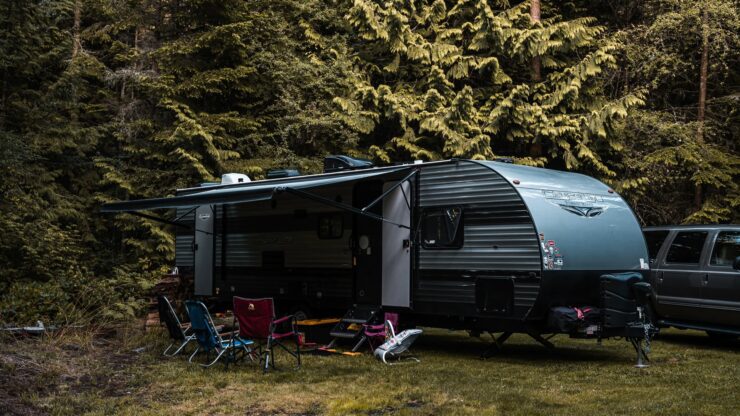
This is where we get into the science of AC/DC. No, not the Australian hard-rock band, but their namesake – alternate and direct current. The 12V batteries in your RV only store direct current (DC), or rather, the energy in the cells is only usable as DC. However, most devices run on alternating current (AC).
That’s where the power converter comes in. Their power is rated in Watts (W). To operate small appliances and devices such as a TV, lamp, laptop, etc., you’ll need a 1500W inverter. You’ll need an inverter with a bit more power for more demanding devices like specific tools.
4. Power Consumption
Calculating whether you can use the different devices in your RV and therefore the amount of power you’ll need can be a bit confusing and complicated, but if you want to be sure that you’ll have enough electricity to do everything you want to in your RV, you will have to do some math.
Remember – your solar panels’ output tells you how fast your batteries can be recharged in full sunlight, while your batterie’s capacity shows you how much power you can store, measured in Ah.
5. Size and Weight
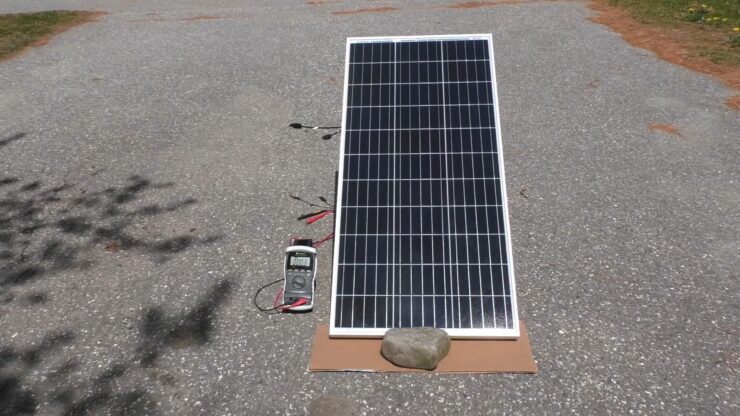
Try to go for a solar panel that is as compact and lightweight as possible for your needs. If you have a large, bulky, and cumbersome solar panel sitting on top of your RV, your experience on the road is going to be less enjoyable.
However, if you’re looking for lots of power and efficiency, a lightweight and small solar panel might be hard to find. The larger the panel, the more power it produces, as a general rule. Tracking down a panel that is both compact and highly efficient might be an issue, so we suggest going for smaller boards, so you can upgrade with extra units when you feel the need to.
How to Install Solar Panels for RV?
Thankfully, the installation of solar panels is not as difficult as it used to be, and it will most likely be a breeze for anyone with a bit of experience with electronics. Most of the models on our list come with pre-drilled holes and hardware for easy installation. However, this doesn’t mean you should take the process lightly, especially if you lack experience with this type of work.
Take great care when installing your panels, because ideally, you don’t want to touch them again once they’ve been set up correctly. Make sure to read the installation manual carefully a few times before starting, even if you’ve done it before since each RV solar panel kit is different. The first and most obvious recommendation is to mount the panels on the roof of your RV, so you can get the most sunlight possible throughout the day.
Another option is to use portable solar panels and place them in a location you think will give them the most exposure to the sun, depending on where you are. This option works best with camping solar panels, but if you plan on purchasing an RV solar kit, the best bet is to mount it on the roof and forget about it.
Putting the panels up at a slight angle can help them reach maximum potential, so think about that as you set them up. Try aligning them in such a way as to make them as efficient as possible.
FAQ
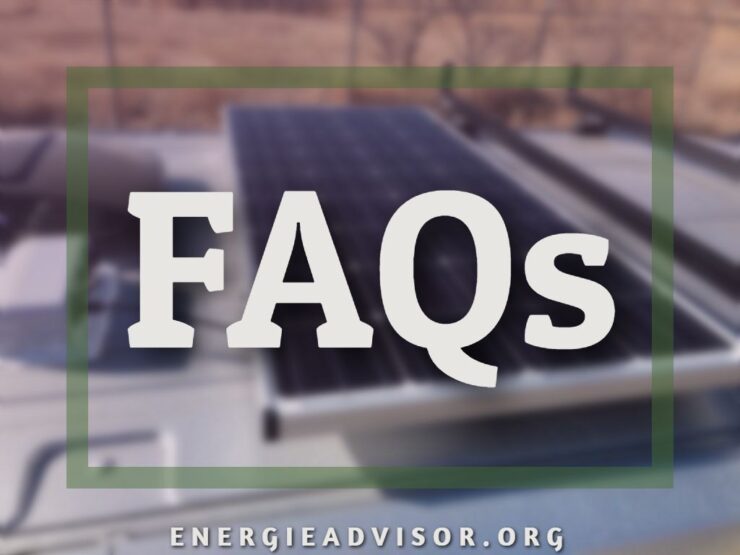
Q1: What Are the Different Types of Rv Solar Panels?
There are three common types of solar panels. Firstly, we have the mono-crystalline panel, which is made of one large silicone crystal – hence the name. It is the most efficient type, yielding the highest charge output. It can also produce more power in sub-optimal conditions.
The second type is polycrystalline, which contains silicon blocks, each made up of small solar crystals. Producing roughly one percent less power than its mono-crystalline counterpart, this is also an excellent choice.
Finally, we have an amorphous or thin-film solar panel. This type makes use of silicone-coated panels on a large bed. It is the cheapest option, but it also yields the lowest amount of power.
Q2: How Do RV Solar Panels Work?
No different than any other type of solar panel, RV panels convert the energy of the sun into power or electricity. They create an electric current when they receive sunlight, and the produced electricity then moves into a charge controller. This is what controls the amount of current that eventually enters your battery. From there, the battery will take over, producing DC power.
To convert that DC power into usable AC that most appliances require, you’ll need an inverter. Once you have all of these devices set up, you should be able to power your blender, phone charger, or laptop using the power of the sun.
Q3: What Are the Benefits of Using an RV Solar Panel?
One of the most significant benefits of installing solar panels on your recreational vehicle is that you will get clean power quietly and efficiently. Solar panels do not consume any fuel nor create any waste products. There are also no moving parts involved, which means there isn’t going to be any mechanical noise coming from your panel.
When it comes to practical applications, solar panels do many great things, such as maximizing the battery life in your RV, as well as generating pure power you can use to run your appliances. Another significant benefit is the electrical independence you will have knowing that you don’t need to plug in for your power.
Conclusion
You can get a lot from picking the right RV solar panels and installing them properly. It can charge your battery using the clean and free energy provided by the sun, allowing you to power all kinds of appliances and devices like phones, laptops, and TVs.
Just remember to look for the right electrical output, efficiency, and size for you after determining your power requirements as well as the budget you are willing to spend.
Hopefully, this list of best RV solar panels and buying guide will help you make an informed decision and have you on your way to being a more independent adventurer!

